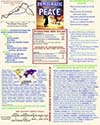[First published April 8, 2005] Socialist of different flavors — leftists, Marxists (alias communists), fellow travelers, and the economically ignorant — continue to rant about the greed, inequality, and economic slavery of the free market (they prefer to call it capitalism), but yet in the grandest of economic experiments, their socialism has utterly failed in practice. When these socialists are free to fully apply their ideas, they end up impoverishing whole countries.
In social science, one way to test a theory it to select two groups of people such that they are virtually identical on all variables but the theoretical one. Want to test whether nature or nurture make a difference in making spelling errors (I insist it’s nature), then test this on identical twins separated shortly after birth.
But, surely, you say, we can’t do such tests on free market vs. socialist systems. Well, we can’t organize it for this purpose, but we can observe what socialist have done. We have had people of one nation, language, culture, religion, literacy, wealth, and so on, divided into two, such that one had a largely free market economic system and the other a purely socialist one, with the socialist being the more prosperous and industrial region to begin with. The divided countries were North Vietnam vs. South Vietnam, and East Germany vs. West Germany, and still is North vs. South Korea. Some might include mainland China vs. Taiwan, but Taiwan (formerly Formosa) was not part of China, although one might point to the fact that both the mainland and Taiwan are now Chinese in language and customs, and thus show what the Chinese can do when they are free as on Taiwan, or still dominantly socialist as on the mainland.
Okay, the experiment. How did these two halves fare, with their economic-political systems being the only meaningful difference? In each case, the socialist half has failed economically compared to its free market one, which in contrast substantially uplifted its people in health, technology, services, economic growth, and wealth. Let me focus on the two Koreas to provide some statistics on this. In what follows, the first figure will be for socialist North Korea, the second for the South (source: The Wall Street Journal, 3/11/05):
Population: 22.5 mil vs. 49.9 mil.
Gross National Income (GNI): $18.4 bil. Vs. $606.1 bil.
GNI per capita: $818 vs. $12,646
Exports: $.78 bil. Vs. $193.8 bil.
Imports: $1.61 bil. Vs. $178.8 bil.
Power generated: 19.6 bil. kwh vs. 322.4 bil. kwh
But, these statistics show only part of the cost of socialism. N. Korea has again cut food rations from last years near starvation level of 300 grams per person per day. Now it is 250 grams (8.8 ounces) per person, according to the UN World Food Program (WFP). This is far below the Food and Agricultural Organization (FAO) minimum. Also, keep in mind that Kim’s food distribution system is highly unequal. Food is put aside first for “patriotic rice” and “military rice.” And then it has a graded ration system depending on whether a family is considered supportive of the regime at higher ration end, and unreliable, possible anti-regime at the bottom.
In the last decade, the human cost of this socialism, leaving aside the regime’s mass murders, has been about 3 million starved to death. Further, malnutrition has caused excessive underdevelopment and brain retardation of children, and fostered rickets, scurvy, nyctalopia, hepatitis, and tuberculosis, among other diseases. And the country is one of the few in which population mortality rates have been increasing. The life expectancy has fallen to 66.8 years from 73.2; newborn mortality rate has increased from 14 to 22.5; and the rate for those less than five years of age has increased from 27 to 48 per thousand.
Meanwhile, in South Korea the per capita calorie intake is 3,268, which is 139 percent of the FAO recommended minimum requirement. This calorie intake is made up of about 84 percent vegetable products and 16 percent animal products. A typical South Korean meal consists of steamed or stir-fried vegetables, thin sliced meats, grilled fish, and bean-baste soup. Life expectancy is 75.6 years and rising; infant mortality is 7.18 per 1,000 live births, and falling.
What more need be shown? Socialism not only kills by the conditions it creates, encourages the ruling thugs to murder their own people (how else impose such a anti-humanitarian, prison like system?), it greatly impoverishes them. The free market, however, constantly improves overall wealth and welfare, and if part of a democratic system, protects and saves lives.
These historical social experiments have cost tens of millions of lives. We must now say, “ENOUGH ALREADY!”
Link of Note
”North Korea: Human Rights Concerns,” (nd) Amnesty International USA
The report has good links and a fair overview:
Amnesty International’s long-standing concerns about human rights violations in North Korea include the use of torture and the death penalty, arbitrary detention and imprisonment, inhumane prison conditions and the near-total suppression of fundamental freedoms, including freedom of expression and movement.
Their expressed “concern” is not the way I would put it. More like horrified, disgusted, sickened.



 Posted by rudyrummel
Posted by rudyrummel 






